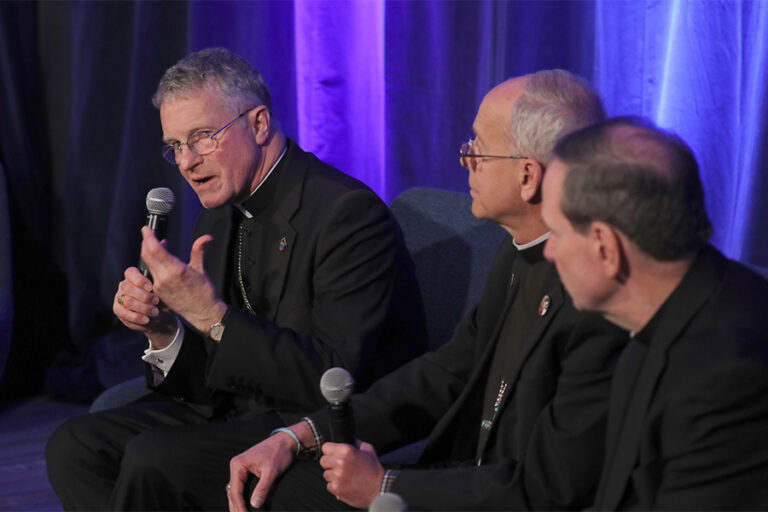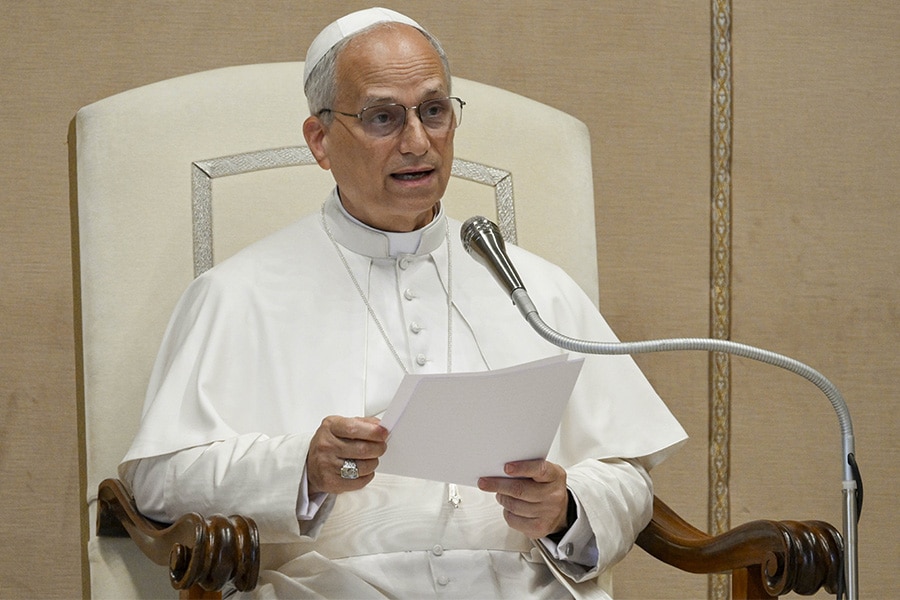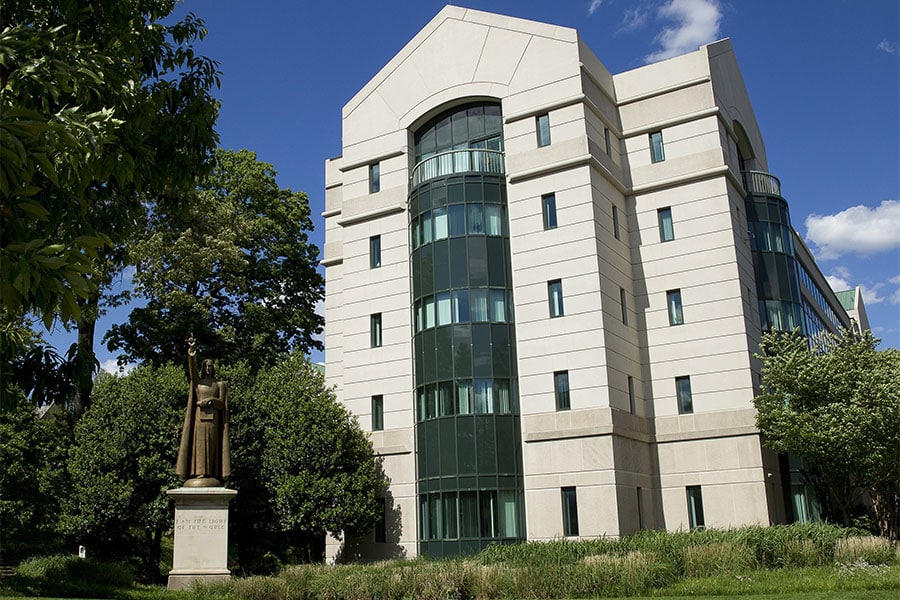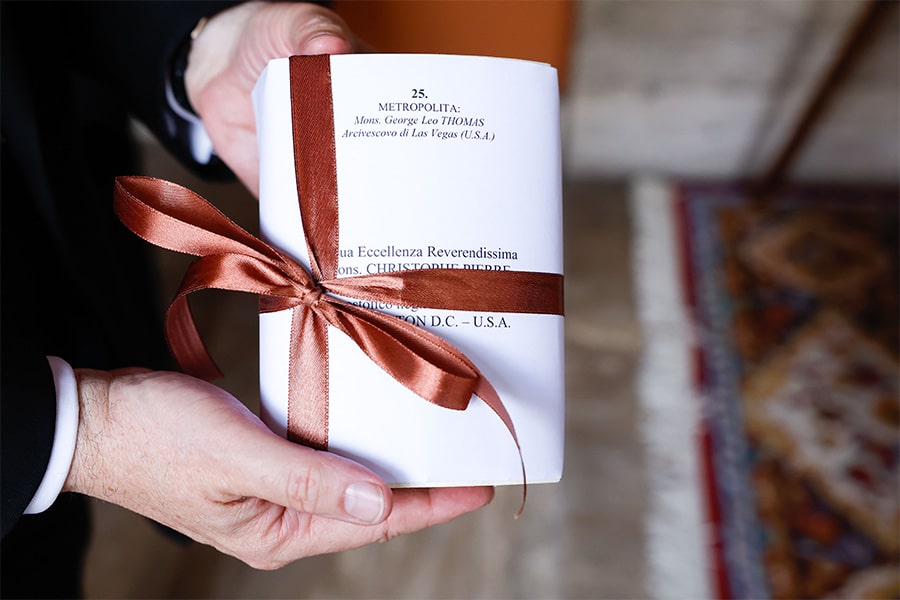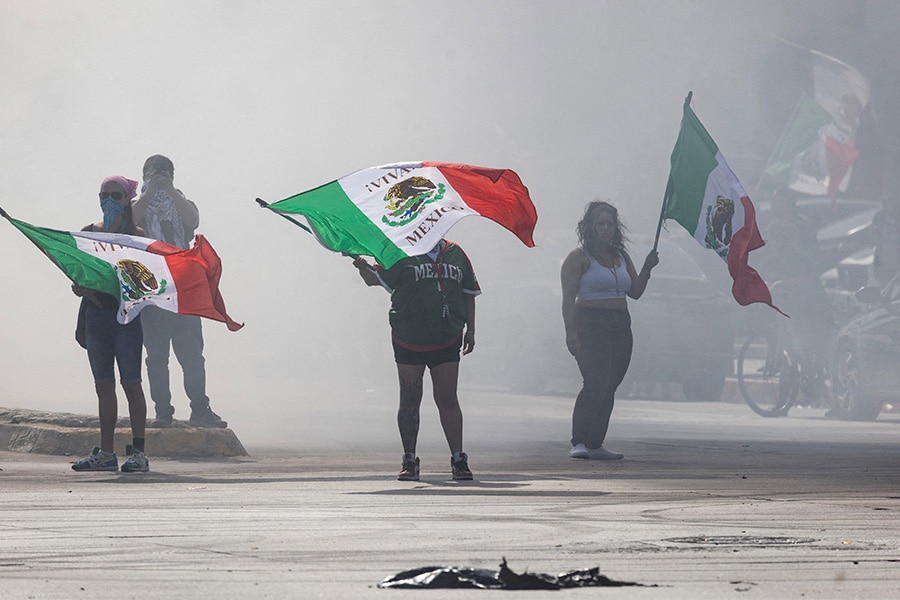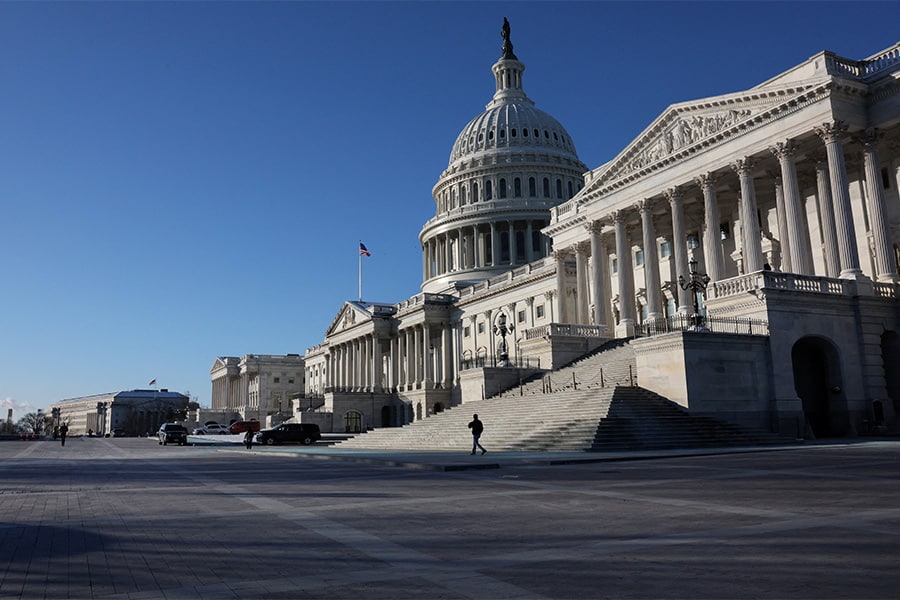The public session of the fall plenary assembly of the U.S. Conference of Catholic Bishops opened Nov. 12 with remarks from Archbishop Timothy P. Broglio of the U.S. Archdiocese for the Military Services, USCCB president, and Cardinal Christophe Pierre, the papal nuncio to the U.S.
In an address of a little less than 20 minutes, Cardinal Pierre spoke to the U.S. bishops about July’s National Eucharistic Congress, the Synod on Synodality, which wrapped up at the end of October, and the upcoming Jubilee 2025 in Rome — all through the lens of Pope Francis’ new encyclical on the Sacred Heart of Jesus, “Dilexit Nos.”
“At the very time when the universal synod was coming to its completion, and with a Jubilee Year about to begin, the pope has somewhat ‘surprised’ us by returning to a very basic element in the church’s piety, something that might even seem too ‘simple’: devotion to the heart of Jesus,” he said. “Isn’t it interesting that, of all things, the pope would give us, precisely at this moment, an encyclical on the Sacred Heart? I think this is something worth paying attention to. What meaning are we to derive from this call to return to the heart?”
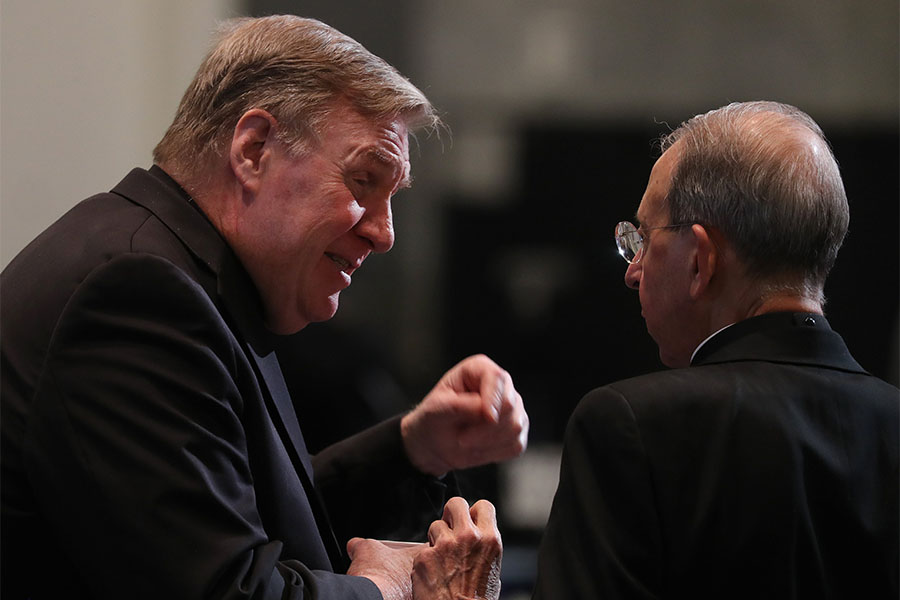
The National Eucharistic Congress was “a religious experience of the saving love of Jesus” — “an experience that is not an end, but a beginning. When we encounter Christ’s love in this way, we are compelled to share it with others. And this is what we are the shepherds of at this time in our country.”
“We must help the church find the answers to the questions that were being asked at the conclusion of the Eucharistic congress: How do we move from personal encounter to mission? Where are the new directions that the Spirit is leading us in our evangelization? What new avenues do we need to open in the life of the church?” he asked. “After all, a broad Eucharistic revival can only occur if we are able to live the Eucharist in all its dimensions: not only by gathering to adore, but also by going out on mission, so that Christ can encounter others.”
Cardinal Pierre acknowledged that “several years into our synodal journey as a church, some are still asking, ‘What is synodality?'” He suggested that the “language of devotion to the Sacred Heart” can help people better understand the term.
“The synodal church is a gathering of people who have come into relationship with the heart of Christ, and who are journeying together in order to share that relationship with others.”
Saying that the synod was never about “completing a to-do list” or “certain outcomes,” he said instead it is “about inviting more participation in the church’s missionary discernment; while at the same time, deepening our shared participation with the Lord.”
Because of this, the success of the synod should not be judged by what decisions were made, but by “the way in which conversations are happening at various levels in the church.”
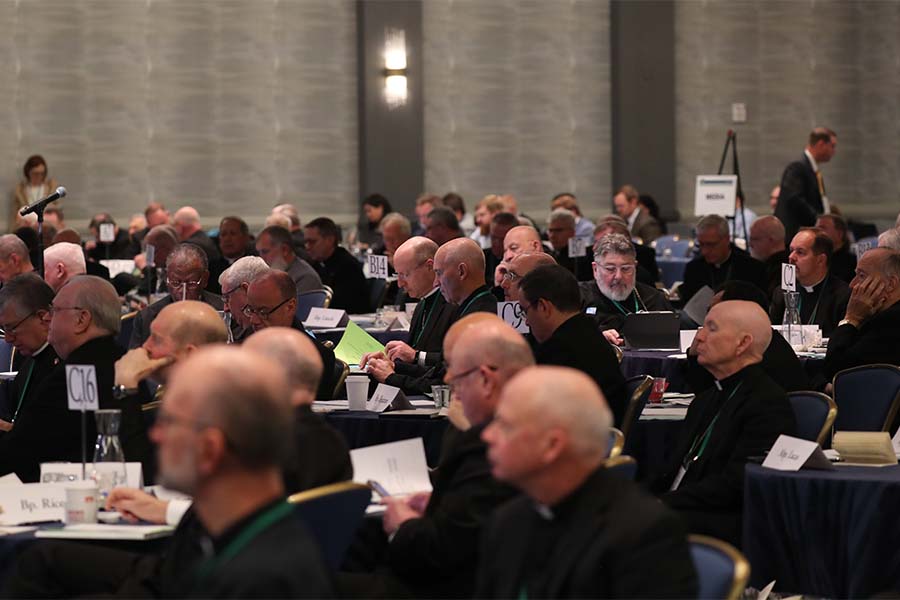
“For those who feel disappointed about the church’s synodal process to this point — either for what it has been or for what it hasn’t been — I would share the encouragement that I think Pope Francis is offering us through this encyclical,” he said. “Essentially the pope is saying to us: Look deeper for what synodality is about. Look to the heart: your own heart, the heart of Christ, and the heart of the other person. From there, we can embark on a shared mission as church.”
Finally, the cardinal addressed the Jubilee Year in Rome, saying that it is “exactly what our world and our country need right now, but which no secular power or political solution could ever achieve.”
“We can all see the fragmentation in the human community, especially during these seasons of heightened political activity. And if we look within, we can see the fragmentation in ourselves,” he said, adding that Pope Francis explains in his encyclical “how the human heart is capable of ‘uniting the fragments.'”
Following Cardinal Pierre’s remarks, Archbishop Broglio began his presidential address with a reference to the Book of Maccabees, recalling “the fidelity of the chosen people in a time of oppression, forced assimilation and rule by a foreign power.” This fidelity, he said, was “sufficient to ensure a temporary victory over the oppressors, but more importantly the preservation and handing on of the Jewish faith to the next generations right up to our time.”
Praising the “moment of unity and celebration” of Christ’s real presence at the Eucharistic congress, he noted that the revival “continues now in its phase of mission” to “help the faithful discover or deepen its meaning, and to prolong the positive effects of the first two years of the Eucharistic revival.”
Following the U.S. presidential election, he reflected on the way in which bishops can serve as examples and speak the truth amid division in society.
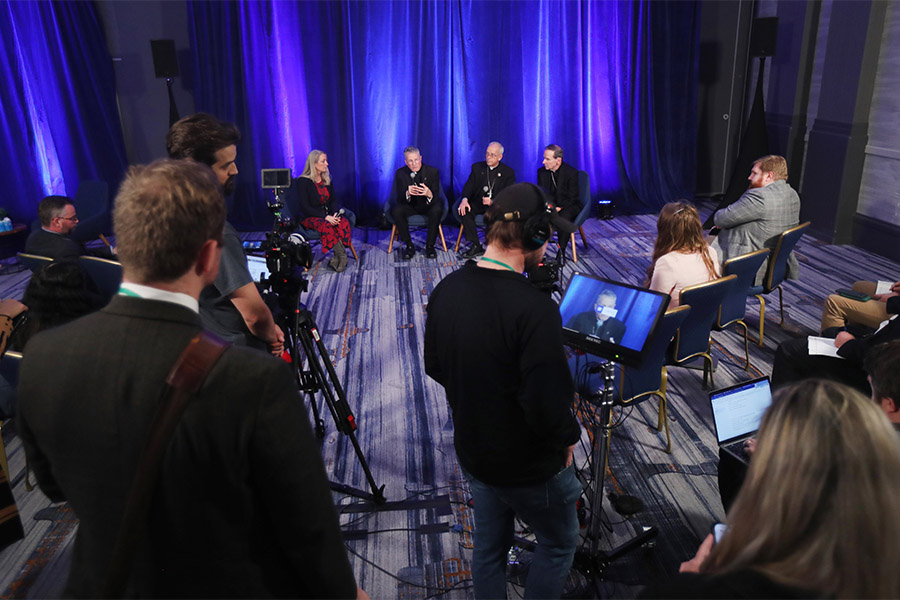
“As the successors of the Apostles and vicars of Christ in our dioceses, we never backpedal or renounce the clear teaching of the Gospel,” he said. “We proclaim it in and out of season.”
“We must insist on the dignity of the human person from womb to tomb, be unstinting in our commitment, as I said yesterday, to see Christ in those who are most in need, to defend and lift up the poor, to combat the evil of racism and to encourage immigration reform, while we continue to care for those in need who cross our borders,” he continued. “We certainly do not encourage illegal immigration, but we will all have to stand before the throne of grace and hear the Lord ask us if we saw him in the hungry, thirsty, naked, homeless, stranger, or sick and responded to his needs.”
He added that there is a need to “encourage people to work together, to listen to each other, and in disagreement never to forget that the other is created in the image and likeness of God and is, therefore, worthy of respect.”
“Christians should be catalysts for a more humane and worthy approach to daily life,” he emphasized. “Nothing is truly ordinary, because it is open to be touched by divine grace.”
The bishops were gathering in Baltimore Nov. 11-14 for their 2024 fall plenary assembly. Only two days of the meeting, Nov. 12-13, will be public and livestreamed on the conference’s website.
This story was co-authored by Lauretta Brown, culture editor for OSV News, and Gretchen R. Crowe, editor-in-chief for OSV News.
Read More Bishops
Copyright © 2024 OSV News

